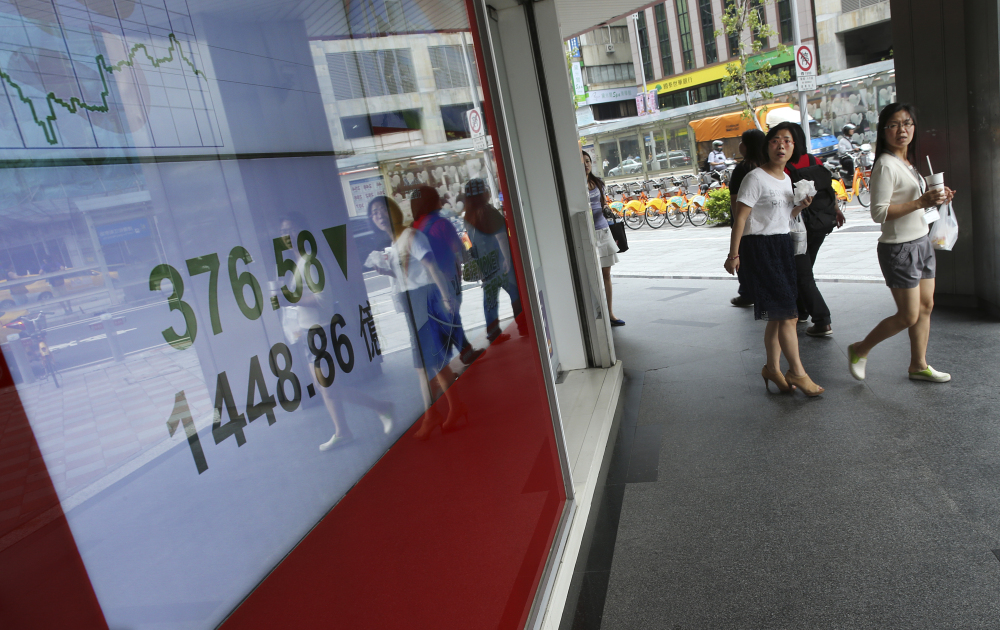BEIJING — China’s state media called it “Black Monday” as the Chinese stock market recorded its biggest slump in eight years and jitters spread throughout Asia and the rest of the world.
The collapse in Chinese stocks was fueled by mounting concerns about an economic slowdown here, but it has fed into a wider sell-off in emerging markets. Asian shares hit a three-year low Monday, and the nervousness appeared likely to spread to Wall Street after last week’s sharp falls there.
“A lot of questions are being asked by investors,” said Chris Weston, chief markets strategist at IG in Melbourne. “This is a confidence game, and when you don’t have confidence, you press the sell button.”
Shanghai’s main share index closed down 8.49 percent, but trading in hundreds of shares was suspended after they lost 10 percent.
The Shanghai Composite Index has fallen by nearly 40 percent since June, after rising more than 140 percent last year. Tokyo’s Nikkei-225 index recorded its biggest drop in more than two years, falling 4.6 percent to a six-month low, while the MSCI index of Asia-Pacific shares outside Japan sank 5.1 percent to a three-year low.
Overnight futures trading suggested further losses were in store for the Standard & Poor’s 500-stock index in the United States after last week’s 6 percent decline. S&P futures dropped 2.4 percent, with even favored stocks such as Apple and Netflix losing more than 4 percent in early New York trading, Bloomberg News reported.
In Europe, Britain’s FTSE 100 index was down 3.5 percent, Germany’s DAX index lost 2.9 percent, and the Stoxx Europe 600 index fell 3.3 percent. The Dax has now fallen 20 percent from its peak in April. If the FTSE 100 finishes down 3.5 percent, the fall would wipe more than $78 billion off the value of the 100 companies in the index, the Guardian newspaper reported.
Middle Eastern stocks also took a hit, with markets in Saudi Arabia, Dubai, Egypt and Israel down sharply.
“Markets are panicking,” Takako Masai, head of research at Shinsei Bank in Tokyo, told the Reuters news agency. “Things are starting to look like the Asian financial crisis in the late 1990s. Speculators are selling assets that seem the most vulnerable.”
Over the weekend, China announced it would allow pension funds to buy shares for the first time, but the move failed to restore confidence. The state news agency Xinhua tweeted that it was “Black Monday!” as China’s shares joined the global panic.
Some traders said the authorities’ failure to step in to buy shares Friday – when the market fell 4.2 percent – generated a sense of panic and forced some funds to liquidate positions. Although pension funds have reported net assets of some $550 billion, experts said they might not want to buy aggressively in a falling market.
“The pension fund signal didn’t work, which proves that investors have entirely lost confidence in the market,” said Wu Xianfeng, president of Longteng Asset Management in Shenzhen. “The market has been in a panic since last week.”
Some brokers said the market was disappointed by the central bank’s failure to add liquidity by cutting banks’ reserve ratios on Monday, as many had expected. But others said even this move would now not be enough to restore confidence.
Ken Peng, Asia investment strategist at Citi Private Bank in Hong Kong said the Chinese authorities were probably biding their time.
“They have a good understanding that they are not going to be able to reverse a global sell-off,” he said. “So they are not wasting their bullets at this point.”
Renewed concern about China’s economy emerged after Friday’s news that a key gauge of manufacturing activity, the Caixin/Markit Purchasing Managers’ Index, showed the sector shrinking at the fastest pace since 2009.
The heavy-handed response of China’s authorities to the initial stock market sell-off also dented confidence among global investors about their commitment to free markets and their ability to manage an economic transition underway here.
This month’s surprise move to allow the Chinese currency to move in line with market forces – a move amounting to a surprise devaluation – only served to fan global fears about China’s economic slowdown.
Nor did the move to put the nation’s pension funds to work to shore up the markets meet with universal approval.
“Did you ever ask the opinion of people who paid into the pension fund?” asked one social media user.
“Who said today’s drop is the biggest in eight years, maybe tomorrow’s is,” user Y-MariaH wrote on the Weibo microblogging site. “Now I understand why people jump from high buildings. After investing into (the) market, I’m having that kind of urge.”
Weston said that after seven weeks of capital outflows from emerging markets, parallels were being drawn to the 1997 Asian financial crisis. But unlike 18 years ago, most countries in the region now have current account surpluses and significant foreign exchange reserves, he said.
“I think we will see stock markets continue to sell off, but we will get to a point where we do settle down,” he said, adding that the markets were looking for firm action by the authorities in China and the United States to stem the slide.
Send questions/comments to the editors.


